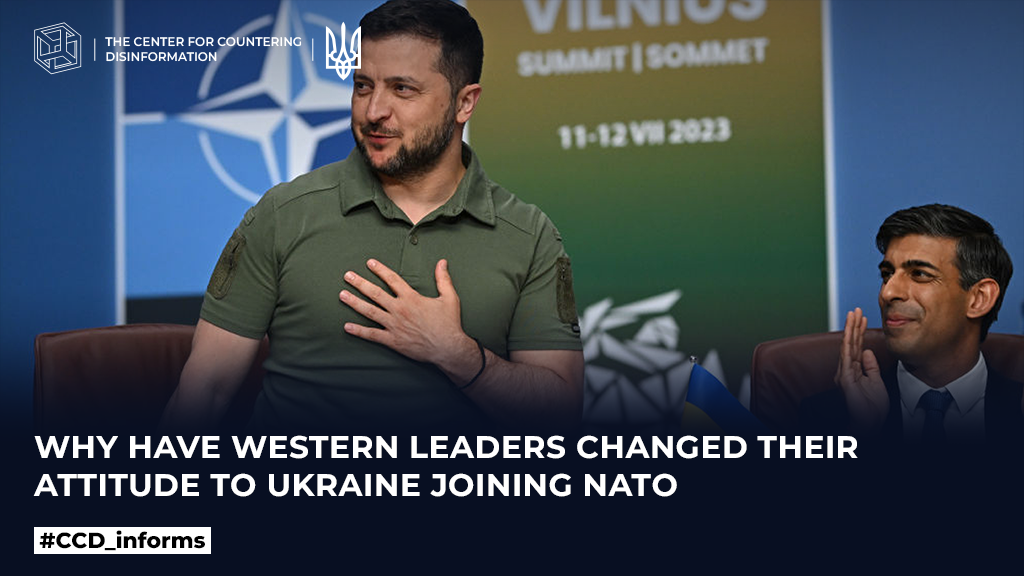The results of the annual meeting of NATO leaders in Vilnius have disappointed the majority of Ukrainians. After all, despite the fact that new supplies of weapons to Ukraine were confirmed and a coalition was created to train Ukrainian pilots to fly F-16 fighter jets, the summit communique did not define clear deadlines for joining NATO. Moreover, they demand “additional democratic and security sector reforms” from Ukraine as one of the conditions of the invitation to join the Alliance. The summit canceled the requirement for Ukraine to implement the Membership Action Plan (MAP), but instead introduced its counterpart – the “adapted Annual National Program” (ANP), which will apply only to Ukraine. The ANP is a huge list of tasks that copies the structure of the MAP, and the phrase “regular evaluation of annual programs” suggests that this is a task designed for long-term, multi-year implementation. That is, although the Alliance summit formally did not close the door to Ukraine’s accession, it actually made the movement towards membership more difficult.
“Suddenly” it turned out that against the background of public support for Ukraine’s proposal to join NATO, there is no consensus on this issue in the Alliance. So, on the eve of the summit, US President J. Biden said that Ukraine is not ready to join the security bloc, and will “prematurely” start the process of joining the Alliance in the midst of the war. And the US President’s national security advisor J. Sullivan frankly stated in an interview with CNN that “the Alliance will work with Ukraine on the way to NATO, but is not ready to invite Ukraine today.”
Why did NATO leaders change the concept of Ukraine’s relations with the Alliance?
Firstly, opponents of the Alliance’s expansion to the East claim that moscow will perceive Ukraine’s accession to NATO as a threat to its national security with the possibility of a pre-emptive nuclear strike, as stated in its official documents. The kremlin narrative, spread in the West, has achieved a certain goal, that if Ukraine becomes a member of NATO, Article 5 on collective defense should automatically be extended to russian-occupied Crimea and Donbas, which significantly increases the risk of a nuclear confrontation. And in the case of NATO’s rejection of the principle of collective defense, it will completely nullify the idea of the Alliance as a military bloc and will create a threat of the spread of russia’s military actions on the territory of Poland and the Baltic states.
Secondly, the lack of a clear decision regarding the invitation of Ukraine to NATO is connected with the financial interests of the USA in Europe. According to experts, the continuation of the war in Ukraine is a secret strategy of the USA for the final elimination of russia from the European gas market and the consolidation of American suppliers of liquefied gas in the EU. In addition, such a position makes it possible to cancel the economic leadership of Germany as the main consumer of russian energy carriers and activate the transfer of the main German productions and assets to the territory of the United States. In this regard, it is also not necessary to prevent agreements between the financial circles of Germany and the top of the russian federation regarding the non-admission of Ukraine to NATO.
Thirdly, the Biden administration considers it necessary to leave space for Ukraine to negotiate with russia, if there is an idea to exchange peace for Ukraine’s non-alignment.
Is there still a chance to get the desired invitation?
The lack of a clear decision regarding the invitation of Ukraine to join NATO in no way cancels the prospects of its future membership and should not be a reason for pessimism. As NATO Secretary General J. Stoltenberg stated at the final press conference, “Ukraine is now closer to NATO than ever.” After all, Germany and the USA are not interested in finally killing Ukraine’s prospect of joining the Alliance. J. Biden noted that “one day NATO countries will celebrate Ukraine’s official membership in the Alliance together.” And German Chancellor O. Scholz, although he is not a supporter of Ukraine’s membership in NATO, is unable to determine the country’s policy without the support of the Bundestag, which advocates for Ukraine’s as soon as possible accession to NATO, because its restoration will be the cheapest for German taxpayers.
It is clear that the final decision on this matter cannot be made before the end of the war with the victory of Ukraine. In the meantime, the foundation of security for Ukraine on the way to NATO should be considered the provision of specific security guarantees to Ukraine by the G7 countries (Japan, Germany, Great Britain, the USA, Canada, France and Italy), which have pledged to support Ukraine in its opposition until the end of the war russian federation It is about supporting the Armed Forces of Ukraine, the military-industrial complex and meeting Ukraine’s immediate needs arising from the war.
❗️In summary, we can say that even the decision of the summit, which is negative for us, should be implemented in such a way as to speed up our integration. The newly created Ukraine-NATO Council provides time and a real opportunity to convince its members to transform the current long-term structure of the ANP into a time-bound and specific list of reforms, the implementation of which will open a real path for Ukraine to receive an invitation to NATO.










